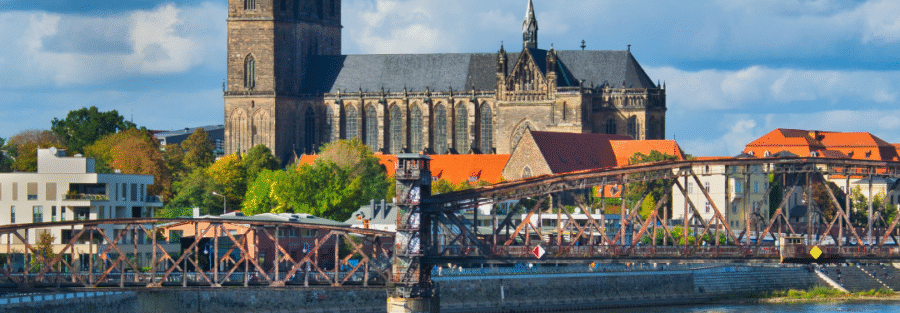When students imagine studying in Germany, names like Berlin, Munich, or Frankfurt instantly come to mind. These cities have the glamour – buzzing nightlife, international exposure, and a fast-paced student life. But there’s another side to Germany that international students often overlook: the smaller, lesser-known cities that quietly offer everything a student could ask for – at half the cost.
If you’re someone who dreams of quality education but worries about skyrocketing living expenses, this blog will take you on a journey through Germany’s affordable hidden gems – cities where education is world-class, communities are welcoming, and living expenses are far lighter on your wallet.
Why Look Beyond the Big Cities?
Before diving into names, let’s pause and ask: Why not Berlin or Munich?
- In cities like Munich, average monthly rent for a student can cross €1,200 (₹1 lakh+), while in Berlin, it’s tough to find anything under €800-€900.
- Everyday expenses like transport, groceries, and leisure are 30-40% higher in big metros.
- High competition for part-time jobs and accommodation often makes life stressful.
Now compare that with a smaller city where rent is €250-€400, cafes serve hearty meals for €5, and you can walk to class without squeezing into a crowded metro. Suddenly, student life feels more manageable, more personal, and definitely more affordable.
City 1: Magdeburg – The Green Capital of Saxony-Anhalt
Nestled on the banks of the River Elbe, Magdeburg is one of Germany’s oldest cities with a surprisingly modern, student-friendly vibe.
- Cost Advantage: Average rent for students is around €300-€350 per month.
- Universities: Otto von Guericke University is well-known for its engineering, natural sciences, and economics programs.
- Lifestyle: The city is compact, green, and easy to navigate by bike. Parks and riverside walks are perfect for students who want balance.
- Part-time Jobs: While not as abundant as in Berlin, there are good opportunities in logistics, retail, and hospitality.
“Sometimes, the most peaceful places are where your ideas grow the loudest.”
City 2: Chemnitz – Germany’s Hidden Engineering Hub
Chemnitz, located in Saxony, may not be glamorous, but it’s a dream for budget-conscious students.
- Cost Advantage: Students often find accommodation as low as €250-€300.
- Universities: Chemnitz University of Technology is well-regarded, especially for technical courses.
- Lifestyle: The city has a strong student community, small but lively cafes, and affordable public transport.
- Special Edge: It’s close to Leipzig and Dresden, so you get the affordability of a small city with easy access to bigger hubs.
“Don’t measure a city by its size, measure it by the opportunities it gives you.”
City 3: Halle (Saale) – The Artistic, Affordable Haven
For students who love creativity and history, Halle offers the perfect mix of culture and affordability.
- Cost Advantage: Living expenses average €650-€700, with rent around €300-€350.
- Universities: Martin Luther University of Halle-Wittenberg is one of Germany’s oldest and most respected universities.
- Lifestyle: Halle has art galleries, theaters, and music festivals – perfect for students interested in humanities and the arts.
- Bonus: Leipzig is just 30 minutes away, offering weekend escapes to a bigger city without the higher living cost.
“Affordable living, priceless experiences.”
City 4: Kiel – The Seaside Student City
Love the ocean? Kiel in northern Germany offers a unique experience for students.
- Cost Advantage: Student housing costs around €350-€400.
- Universities: Kiel University (Christian-Albrechts-Universität) is popular for marine sciences, engineering, and medicine.
- Lifestyle: Students enjoy sailing festivals, beach hangouts, and seafood markets.
- Special Edge: The fresh sea breeze and laid-back culture make Kiel a stress-free place to study.
💡 Visual Idea: A drone shot of Kiel’s port city life with students cycling along the coast.
“Study where the sea meets the soul.”
City 5: Jena – The Small City with Big Opportunities
Though small, Jena in Thuringia is a hub for research and innovation.
- Cost Advantage: Rent around €300-€350, with overall costs averaging €700.
- Universities: Friedrich Schiller University Jena is world-renowned, particularly for physics and life sciences.
- Lifestyle: Jena has a youthful atmosphere, with plenty of international students and a thriving start-up scene.
- Special Edge: Surrounded by hills and vineyards, it’s perfect for nature lovers.
“In small cities, your ideas often get the biggest stage.”
City 6: Rostock – Where History Meets the Baltic Sea
Another coastal beauty, Rostock is rich in maritime history and offers a unique student vibe.
- Cost Advantage: Rent is about €300-€400.
- Universities: University of Rostock is one of the oldest in the world, with strong programs in engineering, medicine, and sciences.
- Lifestyle: The Baltic coast means fresh air, beaches, and sailing trips. Student communities here are tight-knit and welcoming.
“Some cities teach you lessons, others give you horizons.”
Cost Comparison: Big Cities vs Hidden Gems
Here’s an estimated monthly budget breakdown for students:
| City | Rent (€) | Food (€) | Transport (€) | Total Avg (€) |
| Munich | 700-900 | 250 | 90 | 1,200+ |
| Berlin | 600-800 | 220 | 80 | 1,000+ |
| Magdeburg | 300-350 | 180 | 60 | 650-700 |
| Chemnitz | 250-300 | 170 | 60 | 600-650 |
| Halle | 300-350 | 180 | 60 | 650-700 |
| Jena | 300-350 | 180 | 60 | 650-700 |
| Rostock | 300-400 | 200 | 65 | 700-750 |
Final Thoughts: Don’t Just Follow the Crowd
Studying in Germany is not just about the name of the city on your address card. It’s about affordable living, personal growth, and creating memories without financial stress. The hidden gems of Germany prove that you don’t need Berlin’s hype or Munich’s skyscrapers to succeed.
Sometimes, the best student stories are written in the quiet lanes of Halle, the breezy shores of Kiel, or the historic heart of Magdeburg.
“Education is not about where you study, but how you live while you study.”




